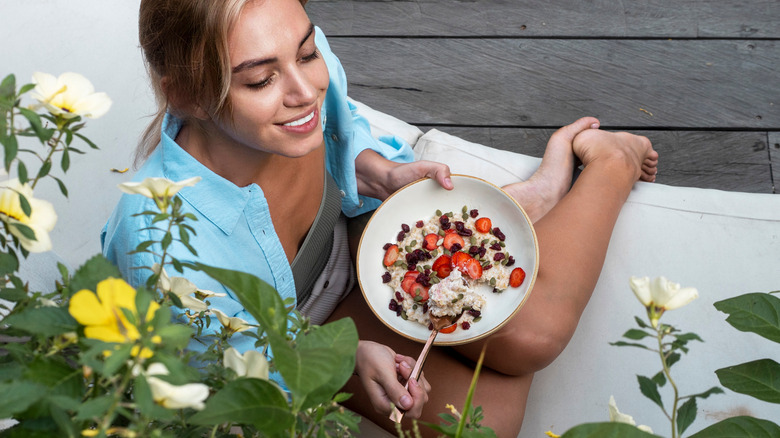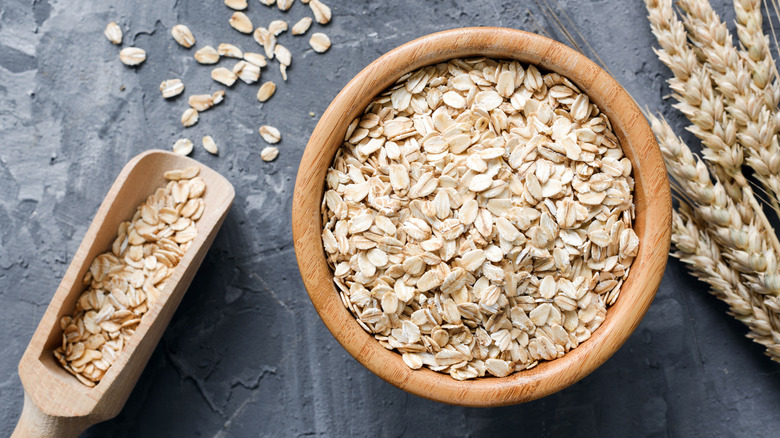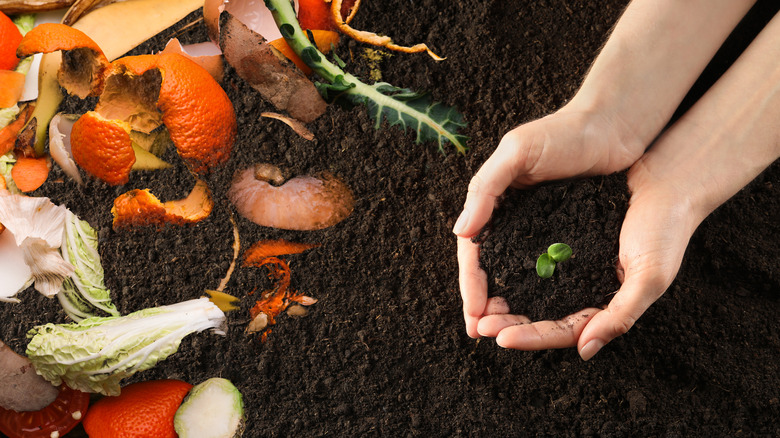Does Using Oatmeal As Fertilizer Actually Help Your Garden?
Plants need more than just sunlight and water to live. Fertilizer is another necessary component to make your garden thrive because it replenishes the macro and micronutrients that plants need to absorb in order to create energy through photosynthesis. Once they've transformed the fertilizer into energy, they can develop a healthy root system, grow their leaves, and produce flowers.
When you shop for commercial fertilizers, you'll notice that they are differentiated by the amount of each chemical in their formula. This goes for liquid and dry options. The chemical compositions are always written as the amount of nitrogen, phosphorus, and potassium in the fertilizer with a dash between the numbers. The micronutrient content won't vary much for each formula. If you don't want to purchase fertilizer, there are other things you can use to replace the nutrients in your garden, and oatmeal has become one homemade option that many people believe does a good job feeding their plants. Some bloggers claim all you have to do is add 2 tablespoons of oats to the soil a month. However, while it's true that this grain contains phosphorous and iron, that doesn't mean it's the best choice to use as a fertilizer in your garden.
Oatmeal as fertilizer is more harmful than helpful
Oatmeal has some of the same nutrients as fertilizer, making it seem like the perfect cheap and organic alternative to synthetic plant food. Unfortunately, the adverse effects of using these grains to feed your plant outweigh the positives. Many people love eating oatmeal, and so does the local wildlife. Covering your garden with this food will not only contaminate your soil, but it will attract all kinds of birds and rodents. If you don't want your yard filled with squirrels, mice, and other pests, keep the oatmeal in your kitchen. It can also be a problem if you have cats or dogs that you let out around your garden. You may find them rummaging around in the soil. Not only will this ruin your plants, but eating uncooked oats isn't good for your pet's health, per Healthline.
Another reason to stick to regular fertilizer is that oats retain a tremendous amount of moisture. This is problematic because if they're mixed into your soil, they will suffocate your plant's roots with all of the extra water, putting them at a high risk of root rot. Once this develops, they'll likely grow mold or fungus and die if the condition is not treated quickly. If you do use oatmeal to fertilize your plants and notice that they're growing slowly, their roots are mushy, or the leaves look distorted, they may have root rot.
Better ways to use oatmeal in your garden
If you're stuck with a surplus of oatmeal and want to find a use for it in your garden, there are better ways to use it besides as a fertilizer. One method is to sprinkle a light layer on top of the soil in your garden or your houseplants. Doing this may treat a slug or snail infestation. Oats work well for this because, once eaten, they absorb the moisture in the snails' stomachs, making them expand until they die. Using this method can be tricky because you must pay attention to how many oats you use. Adding too much will help your snail and slug infestation, but it will attract other wildlife too. (However, this is not a problem if you use it on houseplants.) Remember to keep it away from roots and stems because of the aforementioned root rot.
There is one way to use oats as a fertilizer without any negative side effects. After you've cooked and enjoyed a bowl of oatmeal, don't throw the leftovers into your garbage. Instead, toss them into the compost bin if you have one. For an open pile outdoors, you'll need to disguise the scent of your food with other green and brown items like grass clippings or dirt. Then once your compost has turned into humus, you can use it to fertilize your garden.


